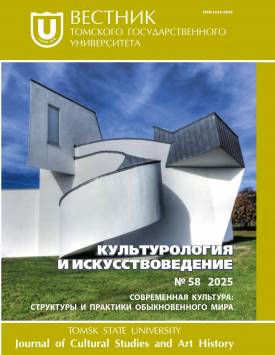About culture “states” in the context of the cognitivepragmatic programs theory (problem update)
The article considers the change of culture “states” in the context of modern ideas about it and the author’s theory of cognitive-pragmatic programs. It is correct to speak not about the successive transition of culture from one state to another, but about the change in the cognitive-mental valence of each modality of the culture state, embodied within the framework of a single state “modern - postmodern”. Three basic forms can be distinguished that differ in this valence: 1) modernism is the dominant modality, postmodernism is an intentionally present modality; 2) reverse picture; 3) transitional (modernism and postmodernism - conditionally dominant-peripheral modality), when the status of both modalities is not regulated. The change in the “states” of culture and the transformation of the modalities that form them are realized within the framework of an integral system (“consciousness of culture” - “consciousness of the subject”), updated simultaneously in two perspectives: 1) “consciousness of culture in the mind of the subject”; 2) “the consciousness of the subject in the consciousness of culture.” There are two options for “status dispositions”: 1) if the dominant component is “consciousness of culture”, then it is in a state of “modern”; 2) if the dominant component is the “consciousness of the subject”, then the “postmodern” state is produced. The cognitive-mental mechanism that ensures uninterrupted “constructive-destructive” functioning and coordination of the qualitative features of the transition of systems from one “state” to another is the CPP (cognitive-pragmatic program). As from CPP the stage model of the cyclic development of culture takes the following form: 1) the system of logocentric CPPs / the system of rhizome-simulative CPPs - a conditionally dominant-peripheral modality; 2) the system of logocentric CPPs - the dominant modality; the system of rhizome-simulative CPPs is an intentionally present modality; 3) the system of logocentric CPPs is a conditionally “de-actualized” modality; the system of rhizome-simulative CPPs is the dominant modality; 4) the system of logocentric CPPs / the system of rhizome-simulative CPPs - a conditionally dominant-peripheral modality. The author declares no conflicts of interests.
Keywords
cognitive-pragmatic program (CPP), modality of the state of culture, modernism, logocentrism, postmodernism, rhizome, metanarrative, “consciousness of culture”, “consciousness of the subject”, metasubjectivityAuthors
| Name | Organization | |
| Ivanov Dmitry I. | Xi'an Shiyou University | Ivan610@yandex.ru |
References

About culture “states” in the context of the cognitivepragmatic programs theory (problem update) | Tomsk State University Journal of Cultural Studies and Art History. 2025. № 58. DOI: 10.17223/22220836/58/6
